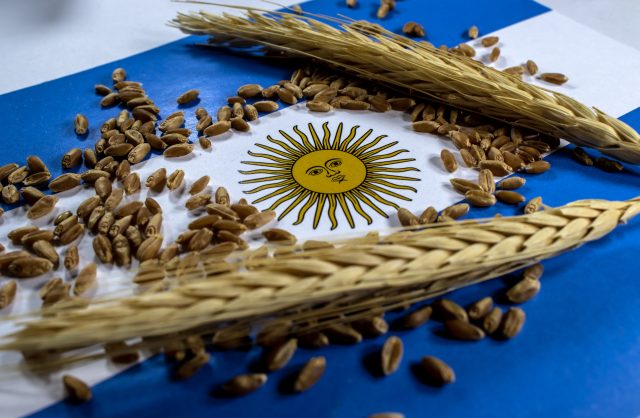This website uses cookies so that we can provide you with the best user experience possible. Cookie information is stored in your browser and performs functions such as recognising you when you return to our website and helping our team to understand which sections of the website you find most interesting and useful.
Wheat harvest to end Argentina’s financial crisis, says cabinet chief
Argentina’s economic woes will be eased by ‘large foreign currency inflows’ from the country’s wheat harvest in November, according to cabinet chief Agustin Rossi.

Unprecedented levels of inflation climbing to 115% in Argentina have been compounded by a devastating drought that has slashed around US$20 billion from the country’s agricultural exports this year.
Following street protests over the cost of living and record drop in consumer purchasing power, Argentina’s government took measures to freeze the price of 1,500 consumer goods for four months last year in an attempt to curb inflation. However, a historic drought plunged the country back into financial crisis, with at least eight severe heat waves hitting in the 2022/23 growing season.
The country is now banking on foreign buyers of its wheat harvest to pull Argentina out of recession.
“This situation ends in November, December of this year,” cabinet chief Augustin Rossi told Reuters.
In 2021 Argentina was the seventh largest wheat exporter in the world, with the biggest buyers of Argentine wheat being Brazil, Chile, Morocco, Indonesia and Nigeria, according to data from The Observatory of Economic Complexity.
Wheat exports brought US$2.71 billion into Argentina in 2021.
The ingredient is a key ingredient in beer making with the Whole Wheat Beer Market projected to grow by 8.1 % CAGR between 2023 to 2029.
Top players in the wheat beer market include Tsingtao Brewery Company Limited, China Resources Snow Breweries, Budweiser, Beijing Yanjing Brewery, Carlsberg, Heineken, Stella Artois, Asahi, Suntory Beer, Kirin and Erdinger Weibbrau.
“Next year you will not have a drought, and you will have savings of US$4 billion because you will have the first stage of the Nestor Kirchner gas pipeline (which will transport natural gas from the Vaca Muerta shale formation) in operation,” Rossi said.
“This will lead to a favourable trade balance and recover reserves, and imply a more controlled exchange rate. This immediately lowers inflation and recovers the purchasing power of wages.”
Argentina’s government has been restricting access to foreign currency to prevent further draining of its central bank reserves, and Rossi said that a devaluation of the Peso would only cause more trouble.
“Inflation does not go down with abrupt devaluation… We do not believe that this is necessary in Argentina,” he said.
Earlier this year, the drinks business reported that a joint currency was on the cards for Argentina and Brazil.
Similar to the Euro, the long-term vision would be to allow other South American nations to join the joint currency in future. The idea behind it is to chip away at the dominance of the US dollar and for the ‘Sur’ (as Brazil wants to call the new currency) to be used in bilateral trade between Latin American countries.
The price of Argentine Malbec has been rising fast due to rampant inflation, with some winemakers fearing they are losing the ability to be competitive in crowded international markets.

